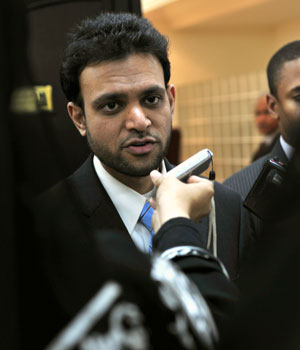
In 2006 University of South Florida computer-science professor Sami al-Arian pled guilty to aiding Palestinian Islamic Jihad and was sentenced to more than four years in prison. At the time of al-Arian’s arrest, then Attorney General John Ashcroft called it “one of the most violent terrorist organizations in the world.”
Before al-Arian pled guilty, Rashad Hussain (appointed Deputy Associate Counsel to President Obama in January 2009) told a 2004 panel discussion on civil rights at a Muslim Students Association conference in Chicago that al-Arian’s very prosecution was “a travesty of justice” that fit a “common pattern … of politically-motivated prosecutions.” When President Obama recently appointed Hussain to be to be his special envoy to the Organization of the Islamic Conference (OIC), Hussain first denied he ever made the statement, and then after confronted with evidence he did, changed his entire story.
Leaving aside the choice of Hussain for a moment, the wisdom of even having a special envoy to the OIC in the first place must be questioned. President George Bush first established the position of an American envoy to the OIC to “listen to and learn from representatives from Muslim states, and … share with them America’s views and values.”
But the decision has resulted in little discernable improvement in OIC behavior. For instance, the OIC remains obsessed with demonizing Israel at the UN Human Rights Council and the organization supports constraints on freedom of speech and freedom of religion in the Human Rights Council and in the General Assembly through their Defamation of Religions efforts.
If the United States is to have an envoy to the OIC at all, it should be filled by an outspoken advocate for America and its interests. He or she should be an unabashed proponent of fundamental rights and freedoms that are constrained in many OIC countries and a knowledgeable and forceful defender of America’s values and policies (including America’s anti-terrorism policies) that frequently are criticized by the OIC as discriminatory or insensitive toward Muslims or inconsistent with Islam. With this purpose in mind, the recent revelations about Rashad Hussein make him a particularly poor choice.
However, even if President Obama had chosen an ideal representative as envoy to the OIC, it is unlikely that he or she would be able to engender a reevaluation by the OIC or its more recalcitrant member states of their long-standing animosity toward Israel and America or their decade long effort to undermine basic rights and freedoms in order to “protect” Islam from criticism, ridicule, or other statements deemed blasphemous. The positions of the OIC are often driven by its more extreme elements in the Human Rights Council and the General Assembly. A public effort by a U.S. envoy to modify OIC policy is more likely to strengthen the voice of the more extreme members of the OIC, like Iran or Saudi Arabia, than it is to strengthen more moderate voices like Jordan or Indonesia.
A for more fruitful strategy would be to approach OIC members bilaterally and seek to encourage them to moderate the tone of the organization in off-line negotiations. An envoy to the OIC is largely superfluous to these efforts.
In the end, it’s hard not to see the decision to establish a U.S. envoy to the OIC as another tepid, politically correct attempt to demonstrate that the U.S. does not “hate” Muslims. The very notion is ridiculous – the U.S. has taken great pains to distinguish and separate the issue of Islamic terrorism from the more than one billion Muslims who rightly abhor such actions. America should never be ashamed of defending its lawful actions to combat terrorism or of championing fundamental human rights and freedoms at the UN.
Heritage
